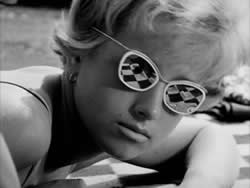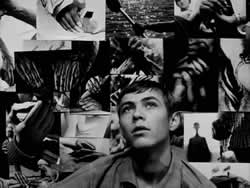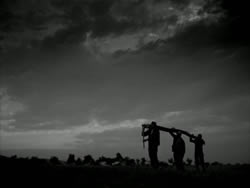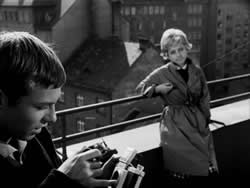
B&W, 1962, 90m.
Directed by Štefan Uher
Starring Marián Bielik, Jana Beláková, Olga Šalagová, Pavel Chrobak, Lubo Roman
Second Run (DVD) (UK R0 PAL)
 It seems almost every major country with an impact on filmmaking in the 1960s had
It seems almost every major country with an impact on filmmaking in the 1960s had  a pivotal coming-of-age film, but none of them are quite like The Sun in a Net. One of the first and most important films in the Czechoslovak New Wave, it has remained inexplicably hidden from most English-speaking audiences (and never released in America in any significant form) but will hopefully find an audience now with a worthy DVD release.
a pivotal coming-of-age film, but none of them are quite like The Sun in a Net. One of the first and most important films in the Czechoslovak New Wave, it has remained inexplicably hidden from most English-speaking audiences (and never released in America in any significant form) but will hopefully find an audience now with a worthy DVD release.
Over the course of a sweltering summer, teenage photographer Fajolo (Bielik) spends his afternoons on the rooftop of his apartment building with neighbor Bela (Beláková), striking up their first romance as they listen to the transistor radio they hang from one of the TV aerials. In between bouts of philosophical banter, they wait for the rare "black sun" eclipse on its way, which will temporarily turn their world to darkness. Both of them have somewhat complicated home lives, with Bela dealing with a blind mother and wayward father while Fajolo finds he is to be sent to a summer farming work camp, ostensibly by choice but really to help his father's flagging reputation with the Communist party. When the lovers are separated, they find their attentions drawn by others -- Peto (Roman) and Jana (Šalagová) -- with Bela reading Fajolo's letters to her new, temporary boyfriend in what proves to be a challenge to their inevitable reunion.
The story itself could have easily become a simple frothy teen film, but director Uher (in only his  second feature) creates an air of excitement and mystery through an accumulation of symbols (culminating in an explanation of that poetic title), gorgeous monochrome photography, and a dense, layered soundtrack mixing sophisticated sound effects with a startling musique concrète score by Ilja Zeljenka. You could easily file this in line with some of the other
second feature) creates an air of excitement and mystery through an accumulation of symbols (culminating in an explanation of that poetic title), gorgeous monochrome photography, and a dense, layered soundtrack mixing sophisticated sound effects with a startling musique concrète score by Ilja Zeljenka. You could easily file this in line with some of the other  pivotal films made around it like The Umbrellas of Cherbourg, The 400 Blows, and its most frequent point of comparison, Antonioni's L'avventura, but what's really surprising is the use of pop art in the urban sequences, a tactic that wouldn't become commonplace in European cinema for at least two more years (most notably Blow-Up and Who Are You, Polly Magoo?). The result is a film that still feels remarkably fresh and alive, a major revelation as well as a crucial entry in the growing body of classic Eastern European cinema being unearthed for English speakers every year on home video.
pivotal films made around it like The Umbrellas of Cherbourg, The 400 Blows, and its most frequent point of comparison, Antonioni's L'avventura, but what's really surprising is the use of pop art in the urban sequences, a tactic that wouldn't become commonplace in European cinema for at least two more years (most notably Blow-Up and Who Are You, Polly Magoo?). The result is a film that still feels remarkably fresh and alive, a major revelation as well as a crucial entry in the growing body of classic Eastern European cinema being unearthed for English speakers every year on home video.
Naturally this release is another feather in the cap for UK label Second Run, whose past accomplishments with Czech and Slovak cinema speak for themselves. The transfer culled from the Slovak Film Institute's restoration looks perfect, with many striking images looking like they're about to punch out of the TV screen. The mono audio sounds clean throughout, with optional English subtitles provided (apparently for only the second time in the world, following a local DVD release in its native country).
Director Peter Strickland (Berberian Sound Studio), who paid tribute to Czechslovak cinema in his earlier feature Katalin Varga, chimes in with a thoughtful 12-minute video featurette in which he discusses stumbling across this film while traveling abroad and, not surprisingly, dissects the more audacious aspects of the film's sound mix and its visually poetic highlights. Author and film professor Peter Hames goes deeper in the liner notes with a very thorough essay covering the film's political obstacles, its complex use of symbolism, and its context within the careers of Uher and co-writer Alfonz Bednár, whose other five films sound fascinating and will hopefully get the Second Run treatment in the near future, too.
Reviewed on August 27, 2013.


 It seems almost every major country with an impact on filmmaking in the 1960s had
It seems almost every major country with an impact on filmmaking in the 1960s had  a pivotal coming-of-age film, but none of them are quite like The Sun in a Net. One of the first and most important films in the Czechoslovak New Wave, it has remained inexplicably hidden from most English-speaking audiences (and never released in America in any significant form) but will hopefully find an audience now with a worthy DVD release.
a pivotal coming-of-age film, but none of them are quite like The Sun in a Net. One of the first and most important films in the Czechoslovak New Wave, it has remained inexplicably hidden from most English-speaking audiences (and never released in America in any significant form) but will hopefully find an audience now with a worthy DVD release. second feature) creates an air of excitement and mystery through an accumulation of symbols (culminating in an explanation of that poetic title), gorgeous monochrome photography, and a dense, layered soundtrack mixing sophisticated sound effects with a startling musique concrète score by Ilja Zeljenka. You could easily file this in line with some of the other
second feature) creates an air of excitement and mystery through an accumulation of symbols (culminating in an explanation of that poetic title), gorgeous monochrome photography, and a dense, layered soundtrack mixing sophisticated sound effects with a startling musique concrète score by Ilja Zeljenka. You could easily file this in line with some of the other  pivotal films made around it like The Umbrellas of Cherbourg, The 400 Blows, and its most frequent point of comparison, Antonioni's L'avventura, but what's really surprising is the use of pop art in the urban sequences, a tactic that wouldn't become commonplace in European cinema for at least two more years (most notably Blow-Up and Who Are You, Polly Magoo?). The result is a film that still feels remarkably fresh and alive, a major revelation as well as a crucial entry in the growing body of classic Eastern European cinema being unearthed for English speakers every year on home video.
pivotal films made around it like The Umbrellas of Cherbourg, The 400 Blows, and its most frequent point of comparison, Antonioni's L'avventura, but what's really surprising is the use of pop art in the urban sequences, a tactic that wouldn't become commonplace in European cinema for at least two more years (most notably Blow-Up and Who Are You, Polly Magoo?). The result is a film that still feels remarkably fresh and alive, a major revelation as well as a crucial entry in the growing body of classic Eastern European cinema being unearthed for English speakers every year on home video.